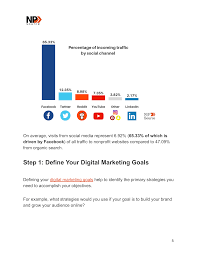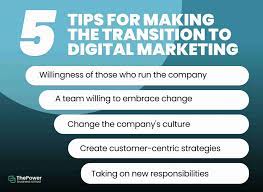The Importance of Digital Marketing for Nonprofits
Nonprofit organizations play a crucial role in addressing social issues and making a positive impact on society. In today’s digital age, having a strong online presence is essential for nonprofits to reach a wider audience, raise awareness about their cause, and attract donors and volunteers.
Benefits of Digital Marketing for Nonprofits
Digital marketing offers numerous benefits for nonprofits, including:
- Increased Visibility: By leveraging digital channels such as social media, email marketing, and search engine optimization (SEO), nonprofits can increase their visibility and reach a larger audience.
- Cost-Effective: Digital marketing is often more cost-effective than traditional marketing methods, making it an ideal choice for nonprofits with limited budgets.
- Targeted Outreach: With digital marketing tools, nonprofits can target specific demographics and tailor their messaging to reach the right audience.
- Engagement: Digital marketing allows nonprofits to engage with supporters in real-time through social media interactions, email campaigns, and online events.
- Data Analytics: By analyzing data from digital marketing campaigns, nonprofits can gain valuable insights into donor behavior, campaign performance, and areas for improvement.
Key Strategies for Effective Digital Marketing
To maximize the impact of their digital marketing efforts, nonprofits should consider implementing the following strategies:
- Social Media Engagement: Maintain an active presence on popular social media platforms to engage with supporters, share updates about your organization, and drive traffic to your website.
- Email Marketing Campaigns: Build an email list of donors and supporters to send regular updates, fundraising appeals, and event invitations.
- Search Engine Optimization (SEO): Optimize your website content with relevant keywords to improve your search engine ranking and attract organic traffic.
- Paid Advertising: Consider investing in paid advertising campaigns on platforms like Google AdWords or Facebook Ads to reach a larger audience and drive conversions.
- Creative Content Creation: Create compelling content such as blog posts, videos, infographics, and success stories to engage your audience and showcase the impact of your work.
In Conclusion
Digital marketing is a powerful tool that can help nonprofit organizations amplify their message, attract supporters, and achieve their mission. By leveraging the right strategies and channels effectively, nonprofits can make a significant impact in the digital landscape while advancing their cause.
Maximizing Impact: Essential Digital Marketing Strategies for Nonprofits – A Guide to Platforms, Principles, and Practices
- What are the 5 D’s of digital marketing?
- Which social media platform is best for nonprofits?
- What is the 80/20 rule for nonprofits?
- What is a good social media marketing strategy for a non profit?
- How to do digital marketing for NGOs?
- Why is digital marketing important for nonprofits?
- What is digital marketing for nonprofits?
- Do charities need digital marketing?
What are the 5 D’s of digital marketing?
The 5 D’s of digital marketing refer to the key elements that are essential for a successful digital marketing strategy for nonprofits. These include Digital Devices, Digital Platforms, Digital Media, Digital Data, and Digital Technology. By understanding and leveraging these 5 D’s effectively, nonprofits can optimize their online presence, engage with their audience, and drive meaningful results in terms of awareness, donations, and support for their cause. Each of these elements plays a crucial role in shaping a comprehensive digital marketing approach that aligns with the unique goals and mission of a nonprofit organization.
Which social media platform is best for nonprofits?
When it comes to choosing the best social media platform for nonprofits, there is no one-size-fits-all answer. Each social media platform offers unique benefits and caters to different audiences. Nonprofits should consider factors such as their target demographic, communication goals, and content strategy when deciding which platform to prioritize. Facebook is a popular choice for nonprofits due to its large user base and robust advertising options. Twitter is effective for real-time updates and engaging with followers, while Instagram is ideal for visual storytelling. LinkedIn can be valuable for networking and reaching professionals in the nonprofit sector. Ultimately, the best social media platform for a nonprofit depends on its specific objectives and audience preferences.
What is the 80/20 rule for nonprofits?
The 80/20 rule for nonprofits, also known as the Pareto Principle, suggests that 80% of results come from 20% of efforts. In the context of digital marketing for nonprofits, this rule emphasizes the importance of focusing on activities that yield the most significant impact. By identifying the key strategies or channels that generate the most engagement, donations, or volunteer sign-ups, nonprofits can prioritize their resources effectively to maximize their outreach and achieve their goals more efficiently. This principle underscores the significance of strategic decision-making and data-driven approaches in digital marketing efforts for nonprofits.
What is a good social media marketing strategy for a non profit?
A good social media marketing strategy for a nonprofit organization involves creating engaging and relevant content that resonates with the target audience. It is essential to identify the right social media platforms where the nonprofit’s supporters and potential donors are active, and tailor the messaging accordingly. Consistent posting, interaction with followers, storytelling through visuals and videos, showcasing impact through success stories, and leveraging hashtags and trends are key elements of a successful social media marketing strategy for nonprofits. By fostering a sense of community, building relationships with followers, and encouraging user-generated content, nonprofits can effectively raise awareness about their cause, drive engagement, and inspire action through social media channels.
How to do digital marketing for NGOs?
When it comes to digital marketing for NGOs, it is essential to tailor strategies that align with the organization’s mission and goals. To effectively promote the work of a nonprofit organization online, NGOs can start by creating a strong online presence through social media platforms, email marketing campaigns, search engine optimization (SEO), and engaging website content. By identifying target audiences, crafting compelling storytelling content, and utilizing data analytics to measure performance, NGOs can leverage digital marketing tools to raise awareness, attract donors and volunteers, and ultimately make a greater impact in advancing their cause.
Why is digital marketing important for nonprofits?
Digital marketing is crucial for nonprofits because it offers a cost-effective and powerful way to amplify their message, reach a broader audience, and engage with supporters. In today’s digital age, having a strong online presence is essential for nonprofits to raise awareness about their cause, attract donors and volunteers, and ultimately make a greater impact on society. By leveraging digital channels such as social media, email marketing, and search engine optimization (SEO), nonprofits can increase their visibility, target specific demographics, analyze campaign performance, and drive meaningful engagement with their audience. Overall, digital marketing plays a pivotal role in helping nonprofits effectively communicate their mission and achieve their goals in an increasingly competitive landscape.
What is digital marketing for nonprofits?
Digital marketing for nonprofits refers to the use of digital channels and strategies to promote the mission, raise awareness, attract donors, and engage with supporters online. It encompasses a wide range of tactics such as social media marketing, email campaigns, search engine optimization (SEO), content creation, and online advertising. By leveraging digital tools and platforms, nonprofits can reach a broader audience, drive engagement, and ultimately achieve their goals more effectively in today’s digital age.
Do charities need digital marketing?
In today’s digital age, digital marketing has become essential for charities and nonprofits to effectively reach their target audience, raise awareness about their cause, and attract donors and volunteers. With the majority of people spending a significant amount of time online, having a strong digital presence is crucial for charities to stay relevant and competitive in the nonprofit sector. Digital marketing allows charities to engage with supporters, share their impact stories, and drive fundraising efforts more efficiently than traditional methods. By leveraging digital marketing strategies such as social media campaigns, email marketing, and search engine optimization, charities can amplify their message and make a greater impact in advancing their mission.




